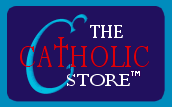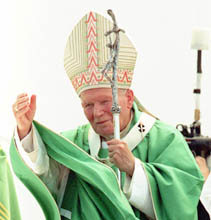|
That may sound like a foolish question but have you ever seriously
considered it? Most Christians (Catholics and non-Catholics alike) seem to just accept
that the Bible is inspired without giving it a second thought.
- Is it because your parents and teachers told you it was?
- Is it because when you read scripture you feel inspired by it?
- Is it because scripture itself states that "all scripture is inspired by God and is
useful for teaching, for reproof, for correction, and for training in righteousness, so
that everyone who belongs to God may be proficient, equipped for every good
work" (2 Tim 3:16-17)?
If you really take the time to think about it, none of these reasons is sufficient for
us to build our system of beliefs on. Consider the following statements. Parents and
teachers have no direct proof or authority to teach us that the Bible is inspired, it
comes from their own traditions! The feeling of inspiration one gets from reading
scripture does not guarantee that scripture is inspired. Finally, many other religious
books claim to be inspired such as the Koran and the Book of Mormon.
The Catholic perspective goes something like this. First we will not presume that the
Bible is inspired but we will look at it strictly from a historical perspective. We can
easily support the historical accuracy of the New Testament from numerous other writings
available to us. Since we know that it is historically accurate, we know that a man named
Jesus actually existed and that He worked numerous miracles during His lifetime and that
He claimed to be the Son of God.
From this we can make two statements about Jesus. Either He was who He said He was, or
He was crazy. If He was crazy, then how do you explain the many miracles, the eye witness
accounts of His resurrection and the numerous people willing to die for him? You can't!
Quite to the contrary, these facts actually point to the conclusion that Jesus was who He
said He was; the Son of God.
Now, if He was the Son of God, we know that He would accomplish all that He said He
would. One of the things He said He would do is to found His Church; "And I tell you,
you are Peter, and on this rock I will build MY church, and the gates of Hell will not
prevail against it. I will give you the keys of the kingdom of heaven, and whatever you
bind on earth will be bound in heaven, and whatever you loose on earth will be loosed in
heaven." (Mat 16:18-19).
Well, now we have a Church founded by Jesus himself which was given the authority to
bind and loose; so what about the Bible?
In the early years of the Church, there was no New Testament. In fact, it was not until
around the year 400 AD that the final version of the books of the Bible was actually
compiled. How do we know that those books of the Bible actually represent the word of
God?
The answer is now quite simple! It doesn't depend on our parents or teachers and
their traditions, our feelings or a statement in a scripture claiming inspiration. We know
the Bible is inspired because the Church that Christ founded used the teaching authority
given by Christ to discern which scriptures were inspired and which were not! |
"We know the Bible is inspired because
the Church that Christ founded used the teaching authority given by Christ to discern
which scriptures were inspired and which were not!" |

|

|
Are Catholics biblical illiterates? |
So goes the frequent question, proving that myths die hard. But
Catholics ought to be able to answer the charge made by many non-Catholics in this regard.
This book is a response to Fundamentalist critics and an explanation of the Catholic
biblical tradition.
The
Catholic Church and the Bible is a significant scriptural study guide, published
from a Catholic perspective and particularly keyed to the new Catechism of the Catholic
Church. The well-planned, straight forward text is clearly outlined to make
information easy to find and understand. Main topics include:
- The Catholic understanding of the Bible
- God's Word and its purpose in the Church
- A biblical theology of the Mass, the place of the Bible in the Sacred Liturgy
- A question-and-answer section that deals with pertinent and popular inquiries made by
Catholics and non-Catholics alike
This work should be heartily welcomed by both clergy and laity, for
Father Stravinskas sheds new light on Catholic Bible study by writing with candor, clarity
and scriptural backing. This is ideal for use in Catholic high schools and in parish RCIA
programs.
Order Your Copy Today! Click here to find out how.
Fr. Peter M.J. Stravinskas is the well-known editor of the Catholic
Answer magazine, is a contributing editor to the National Catholic Register,
and has written over 500 articles for numerous Catholic publications. |

"to get to the heart
of Scripture, think covenant not contract, father not judge, family room not courtroom;
God's laws and judgements are meant to be interpreted as signs of his fatherly love,
wisdom and authority. This does not imply a lower or less strict standard of
justice, however, since a good father requires more from his son than the judge expects
from a defendant, or the boss from the employee."
Scott Hahn, Ph.D.
A Father Who Keeps His Promises
Servant Publications @ 1998 |